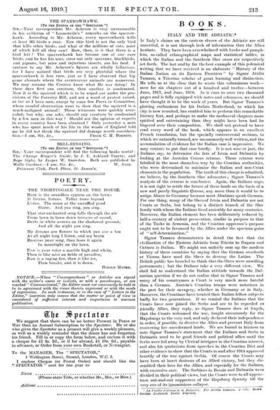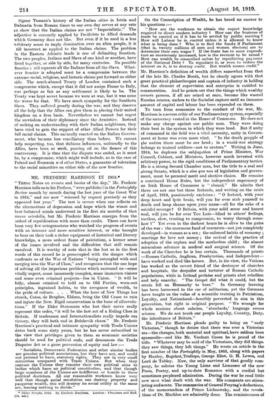BOOKS.
ITALY AND THE ADRIATIC.* IF Italy's claims on the eastern shores of the Adriatic are still unsettled, it is not thrmigh lack of information that the Allies hesitate. They have been overwhelmed with books and pamph- lets, so-called ethnographical maps and statistical tables, in which the Italian and the Southern Slav cases are respectively set forth. The last and by far the best example of this polemical writing that we have received is an elaborate "History of the Italian Nation on its Eastern Frontiers " by Signor AWE° Tamaro, a Triestine scholar of great learning and distinction. He tells us at the close that he wrote this voluminous work— save for six chapters out of a hundred and twelve—between June, 1917, and June, 1918. As it runs to over two thousand pages and is fully equipped with notes and references, we should have thought it to be the work of years. But Signor Tamaro's glowing enthusiasm for his Italian Motherland, to which his city is now reunited, has enabled him to perform this remarkable literary feat, and perhaps to make the mediaeval chapters more spirited and entertaining than they might have been had he lingered over their composition. We shall not pretend to have read every word of the book, which appears in an excellent French translation, but the specially controversial sections, to which we naturally turned, are uncommonly well written, and the accumulation of evidence for the Italian case is impressive. We may venture to put that case briefly. It is not wise or just, the Italians say, to determine the fate of Istria and Dalmatia by looking at the Austrian Census returns. Those returns were falsified in the most shameless way by the Croatian authorities, who were determined to minimize the Italian and non-Groat elements in the population. The truth of this charge is admitted, we believe, by the Southern Slav advocates ; Signor Tamaro's analysis of the returns is conclusive. Again, the Italians urge, it is not right to settle the future of these lands on the basis of a new and purely linguistic Census, any more than it would be to assign Alsace to Germany because most Alsatians speak German. For one thing, many of the Slays of Istria and Dalmatia are not Croats or Serbs, but belong to a distinct branch of the Slav family with whom the Italians lived amicably for many centuries. Moreover, the Italian element has been deliberately reduced by half-a-century of violent persecution, similar in purpose to that of the Turks in Armenia, and the Croatian oppressor's purpose ought not to be favoured by the Allies under the specious guise of " self-determination."
Signor Tamaro demonstrates in detail the fact that the civilization of the Eastern Adriatic from Trieste to Ragusa and Cattaro is Italian. We might not unfairly sum up the modern history of these countries by saying that the German overlords at Vienna have used the Slays to destroy the Latins. The British public has been led to think that the Slays were unwilling instruments ; but the Italians take a very different view. We shall fail to understand the Italian attitude towards the Dal- matian question if we do not realize that to Signor Tamaro and many of his countrymen a Croat is very much more hateful than a German. Austria's Croatian troops were notorious in the past for their savagery, whether in Germany or in Italy. Moreover, the Croatians have treated their Italian fellow-subjects badly for two generations. If we remind the Italians that the Croats have now joined the Serbs and are to be regarded as friendly Allies, they reply, as Signor Tamaro does at length, that the Croats welcomed the war, fought strenuously for the Hapsburgs to the very end, and only declared their independence in order, if possible, to deceive the Allies and prevent Italy from recovering her unredeemed lands. We are bound in fairness to note Signor Tamaro's statement that the Italians and Serbs. in Dalmatia used to be good friends and political allies until the Serbs were led away by Clerical intrigues in the Croatian interest, and also his quotations from speeches in the Croatian Diet and other evidence to show that the Croats in and after 1914 approved heartily of the war against Serbia. Of course the Croats may have been at heart desirous of an Allied victory, but they dis- sembled their love for the Allies, and especially for the Italians, with excessive care. The Serbians in Bosnia and Dalmatia were divided in their political views, but the Croats were to all appear- ance out-and-out supporters of the Hapsburg dynasty till the very eve of its ignominious collapse.
La Venertie Julienne et la Dalinfitie. Dar AWE° Tamara. 3 vols. Komi Societe .Naztonale Dante Angideri.
Signor Tamaro's history of the Italian cities in Istria and Dalmatia from Roman times to our own day serves at any rate to show that the Italian claims are not " Imperialistic." The adjective is currently applied by Pacificists to Allied demands which Germany does not like. But even if it be used in a less arbitrary sense to imply domination over an alien people, it is till incorrect as applied to the Italian claims. The problem in the Eastern Adriatic lands is one of delimiting frontiers. The two peoples, Italians and Slays of one kind or another, have lived together, or side by side, for many centuries. No possible frontier c uld separate all the Italians from all the Slays. What- ever frontier is adopted must be a compromise between the extreme racial, religious, and historic claims put forward on either side. The much-abused Treaty of London contained such a compromise which, except that it did not assign Fiume to Italy, was perhaps as fair as any settlement is likely to be. The Treaty was kept secret because we were at war, but it was none the worse for that. We have much sympathy for the Southern Slays. They suffered greatly during the war, and they deserve all the help that the Allies can give them in placing their united kingdom on a firm basis. Nevertheless we cannot but regret the unwisdom of their diplomacy since the Armistice. Instead of seeking an understanding with their Italian neighbours, they have tried to gain the support of other Allied Powers for their full racial claims. This naturally reacted on the Italian Govern- ment, who became less conciliatory than before. We cannot help suspecting, too, that dubious influences, unfriendly to the Allies, have been at work, pouring oil on the flames of this controversy. It is time that the dispute was ended, as it must be, by a compromise, which might well include, as in the case of Poland and Rumania and other States, a guarantee of toleration to the racial minorities on either side of the new frontier.



































 Previous page
Previous page